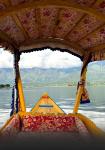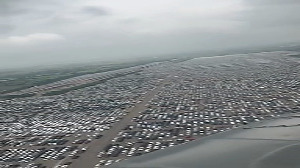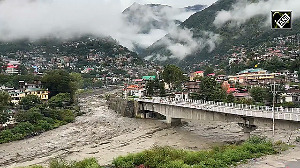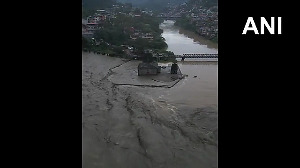A special Olympic flame has reached the Mount Everest base camp for its ascent to the world's highest peak in the restive Tibet, which witnessed the worst anti-government protests since 1989.
Coverage: Tibet Revolts
The flame reached the base camp on Sunday, an official with the Mt Qomolangma (Everest) Olympic torch relay said in Tingri County of Tibet's Xigaze Prefecture, official Xinhua news agency said.
The torch, which reached the camp, is separate from the one on the global run, which was on Sunday passed through South Korea before it was headed for North Korea. Its passage was marred by protests in London, Paris and San Francisco.
A team of torch bearers would take the flame to the summit on a day when weather permits.
Security personnel have been deployed in good strength at the Base Camp to ward off any possible attempts to disrupt the relay plans on which Beijing has invested much prestige.
Reports said China has banned climbing expedition from its side, and authorities in Nepal had also tightened security to prevent any trouble from the southern side of the border straddling mountain.
The flame to be taken to the Mount Everest is specially designed to keep it burning in thin air.
China had recently announced the completion of work on improving the 108-km highway to the Mt Everest in preparation for the relay to the summit, which the regional government has vowed to make a 'complete success'.
The highway was built from a makeshift road between Xigaze prefecture and the Mount Everest Base Camp under a $21 million project that began in June last year. Over 90 per cent of the roadside had been covered by grass.
"We will fully prepare for it and the Olympic torch relay in Tibet will be a complete success," the Tibet Autonomous Region Chairman Qiangba Puncog said in Beijing recently.
Tibet is already under tight security after last month's protests, which rattled the Communist leadership. Further, the relay to the summit has exerted more pressure on the regional government to ensure its smooth run.
Tibet has remained out of bounds for journalists, barring two government organized trips.
The government has taken a group of foreign journalists to cover the event on a controlled-trip. However, some reporters have expressed fears that the three-day trip up to the base camp at 5,150 metres was too short and could cause high altitude sickness and other complications.





